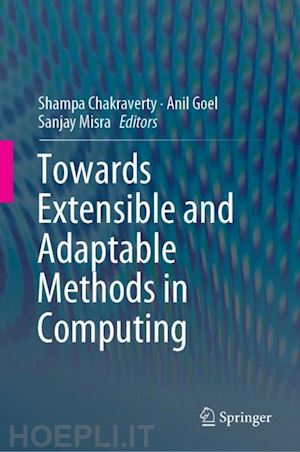
Questo prodotto usufruisce delle SPEDIZIONI GRATIS
selezionando l'opzione Corriere Veloce in fase di ordine.
Pagabile anche con Carta della cultura giovani e del merito, 18App Bonus Cultura e Carta del Docente
This book addresses extensible and adaptable computing, a broad range of methods and techniques used to systematically tackle the future growth of systems and respond proactively and seamlessly to change. The book is divided into five main sections: Agile Software Development, Data Management, Web Intelligence, Machine Learning and Computing in Education. These sub-domains of computing work together in mutually complementary ways to build systems and applications that scale well, and which can successfully meet the demands of changing times and contexts. The topics under each track have been carefully selected to highlight certain qualitative aspects of applications and systems, such as scalability, flexibility, integration, efficiency and context awareness.
The first section (Agile Software Development) includes six contributions that address related issues, including risk management, test case prioritization and tools, open source software reliability and predicting the change proneness of software. The second section (Data Management) includes discussions on myriad issues, such as extending database caches using solid-state devices, efficient data transmission, healthcare applications and data security. In turn, the third section (Machine Learning) gathers papers that investigate ML algorithms and present their specific applications such as portfolio optimization, disruption classification and outlier detection. The fourth section (Web Intelligence) covers emerging applications such as metaphor detection, language identification and sentiment analysis, and brings to the fore web security issues such as fraud detection and trust/reputation systems. In closing, the fifth section (Computing in Education) focuses on various aspects of computer-aided pedagogical methods.Chapter 1. Risk Assessment Framework: ADRIM Process model for Global Software Development.- Chapter 2. An Extended Test Case Prioritization Technique using Script and Linguistic Parameters in a Distributed Agile Environment.- Chapter 3. AutoJet: Web Application Automation Tool.- Chapter 4. Prioritisation of User Story Acceptance Tests in Agile Software Development using Meta Heuristic Techniques in Comparative Analysis.- Chapter 5. Software Reliability assessment using Deep Learning Technique.- Chapter 6 . Empirical Validation of OO metrics and machine learning algorithms for software change proneness.- Chapter 7. Extending database cache using SSDs.- Chapter 8. Cloud Based Healthcare Monitoring System Using STORM And KAFKA.- Chapter 9. Honeynet Data Analysis and Distributed SSH Brute-Force Attacks.- Chapter 10. Efficient Data Transmission in WSN: Techniques & Future Challenges.- Chapter 11. A Study of Epidemic Spreading and Rumor Spreading over Complex Networks.- Chapter 12. Medical Alert System using Social Data.- Chapter 13. A novel framework for portfolio optimization based on modified Simulated Annealing algorithm using ANN, RBFN and ABC Algorithm.- Chapter 14. A Proposed Method for Disruption Classification in Tokamak using Convolutional Neural Network.- Chapter 15. Comparative Evaluation of Machine Learning Algorithms for Network Intrusion Detection Using Weka.- Chapter 16. Super-Intelligent Machine Operations in 21st Century Manufacturing Industries: A Boost or Doom to Political and Human Development?.- Chapter 17. Exploring Ensembles for Unsupervised Outlier Detection: An Empirical Analysis.- Chapter 18. A Review of Type-III Metaphors.- Chapter 19. Multi-Class Classification of Sentiments in Hindi Sentences Based on Intensities.- Chapter 20. Language identification for Hindi language transliterated text in Roman Script using Generative Adversarial Networks.- Chapter 21. An improved Similarity Measure to alleviate sparsity problem in Context Aware Recommender Systems.- Chapter 22. Trust and Reputation-Based Model to Prevent Denial of Service Attacks in Mobile Agent System.- Chapter 23. Fraud Detection in Online Transactions Using Supervised Learning Techniques.- Chapter 24. Real-time Printed Text Reader for Visually Impaired.- Chapter 25. Knowledge and Belief Based Task Assignment in Crowdsourcing Platform.- Chapter 26. Teaching Algorithms Using an Android App.- Chapter 27. Keyword Extraction using Graph Centrality and WordNet.- Chapter 28. Hybrid Mobile Learning Architecture for Higher Education.- Chapter 29. Using Collaborative Robotics as a Way to Engage Students.- Chapter 30. Assessing Scratch Programmers’ Development of Computational Thinking with Transaction-Level Data.
Dr. Shampa Chakraverty is a Professor at the Computer Engineering Division of Netaji Subhas Institute of Technology, New Delhi. She completed her B.E. in Electronics and Communication Engineering at Delhi University, her M.Tech. in Integrated Electronics and Circuits at the IIT Delhi, and her PhD at Delhi University.
Her research interests include sentiment, emotion and human language analysis, E-learning and engineering pedagogy, computer security – trust and digital watermarking, and design exploration of multiprocessor architectures.
Dr. Anil Goel is the Vice President of Engineering at SAP Canada, where he is also head of global development for a number of products and technologies related to SAP’s HANA Platform. He earned a Ph.D. (CS) from the University of Waterloo, Canada, and an M.Tech. (CS) from the IIT Delhi.
Dr. Sanjay Misra is a Professor of Computer (Software) Engineering at Covenant University (CU), Nigeria. He received his M.E. in Software Engineering and his Ph.D. in Information Engineering from the University of Alcala, Spain.











Il sito utilizza cookie ed altri strumenti di tracciamento che raccolgono informazioni dal dispositivo dell’utente. Oltre ai cookie tecnici ed analitici aggregati, strettamente necessari per il funzionamento di questo sito web, previo consenso dell’utente possono essere installati cookie di profilazione e marketing e cookie dei social media. Cliccando su “Accetto tutti i cookie” saranno attivate tutte le categorie di cookie. Per accettare solo deterninate categorie di cookie, cliccare invece su “Impostazioni cookie”. Chiudendo il banner o continuando a navigare saranno installati solo cookie tecnici. Per maggiori dettagli, consultare la Cookie Policy.